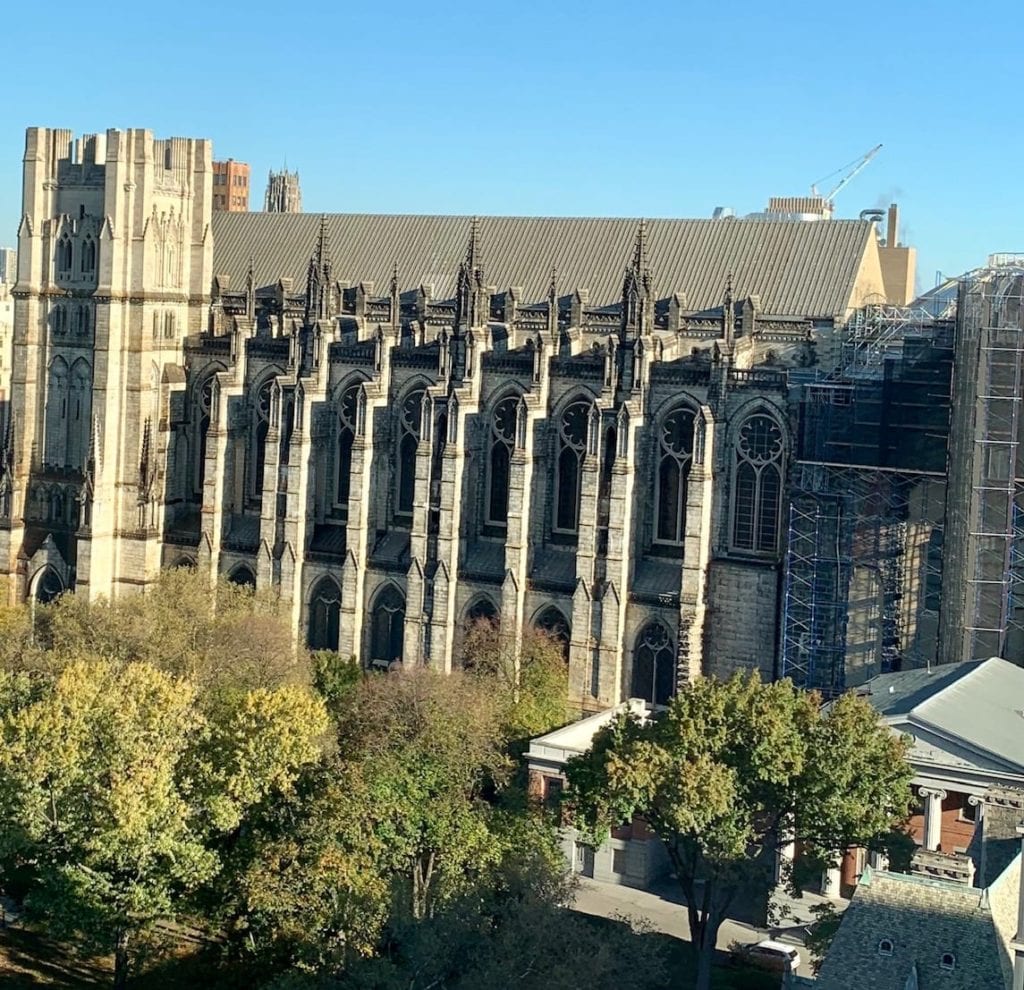
Unfinished Spaces
“Over there is the Cathedral of St. John the Divine,” I say. Peering out the large windows of our rented apartment and pointing across 110th Street, I gesture to my wife Tracey and our daughters Meredith and Holly, “Come take a look.”
It’s a Friday afternoon in early November and we have just arrived in New York for a long weekend. Three years have passed since my Parkinson’s diagnosis, almost to the day. Sunday I will run the New York City Marathon.
Located a few blocks from Columbia University, this cathedral remains unfinished even though its construction began in the late 19th century. As a graduate student at Columbia in the 1990s, I occasionally went to St. John’s to find solitude and to reflect on life’s bigger questions: those of meaning, purpose, and hope.
Scaffolding and work crews notwithstanding, the cathedral has a long, beautiful, Gothic-style nave that still captivates me. This sanctuary—a place of refuge—draws visitors of every nation and creed. At the same time, it attracts people from a variety of religious and spiritual traditions as well as those living with more questions than answers. Seekers and skeptics, themselves unfinished and on paths of discovery, journey to this place. I suspect that, like me, many who visit long to gain more insight, perhaps to unload their burdens, and even to catch a glimpse of the divine.
Tracey and I will take our girls there on Monday, the day after the marathon.
Spiritual Things
It’s the evening before the marathon that grips me now, when I experienced another kind of sanctuary.
Those of us running for Team Fox*—120 in total and 4 of us with Parkinson’s—gather at a Midtown restaurant for an early dinner with our families. Michael J. Fox, who has lived courageously with Parkinson’s for nearly 30 years, joins us. He speaks eloquently in both humorous and poignant ways about what the Team Fox community has meant to him over the years.
Visibly moved as he looks around the room at all of us, he says, “You should see how beautiful you are,” and then shares a few memories from marathons he’s witnessed and speaks with joy about his foundation putting a team together each year to run.
Many of us watch with our own full heart and moist eyes.
At one point he pauses and says, “I’ve been thinking about spiritual things.”
He tells us that his youngest daughter’s birthday sometimes falls on the day of the marathon, as it will this year, and that she was born in 2001, not long after the horrific events of 9/11. After weeks of uncertainty about there being a marathon that year, in a city carrying so much pain and with many burdens to shed, he recalls standing at his apartment window with his newborn daughter in his arms and watching crowds of marathon runners as they passed by.
He says, “I remember looking out at the people and I thought to myself…this is beautiful; this is what people can do and how they can overcome.”
Again he pauses. Then, acknowledging that we all have our own personal pain and burdens to endure, whether because we live with Parkinson’s or we love someone who does, he says, “It’s the same looking out that window to look out at all of you. It means so much. I love you all. I know you are all here for your own reasons and for your own people. But we are all our people.”
Journeys
As with any chronic illness, Parkinson’s makes us journeyers. Against our will, it grabs us, disorients us, and places us on a path of discovery. There we must find our bearings and search for ways to live a full life with a disease that seeks constantly to take life away.
Like those making visits to the cathedral, we who journey with this insidious disease represent every nation, creed, and spiritual path. We also live in unfinished spaces laced with profound questions of meaning, and purpose, and hope.
What’s more, we have burdens to unload. We long to find healing. Often in need of maintenance if not repair, we require permanent scaffolding for support. For all of these reasons, and more, we need all our people.
I see this more vividly now.
In these unfinished spaces, with our people, I catch a glimpse of the divine.
_______
*Team Fox is a grassroots fundraising community of the Michael J. Fox Foundation for Parkinson’s Research
Allan Cole is a professor in The Steve Hicks School of Social Work at The University of Texas at Austin. Diagnosed with Parkinson’s in 2016, at the age of 48, he serves on the Board of Directors at Power for Parkinson’s, a non-profit organization that provides free exercise, dance, and singing classes for people living with Parkinson’s disease in Central Texas, and globally via instructional videos. He also serves as a Community Advocate for ParkinsonsDisease.net, writing columns about living well with Parkinson’s. He is author or editor of 10 books on a range of topics related to bereavement, anxiety, and spirituality. Currently, he is writing a book on counseling people with Parkinson’s disease, which will be published by Oxford University Press.
Follow him on Twitter: @PDWiseBlog
